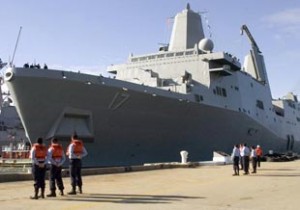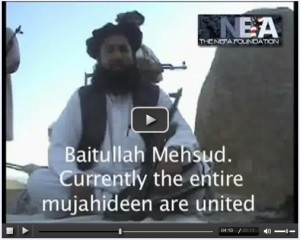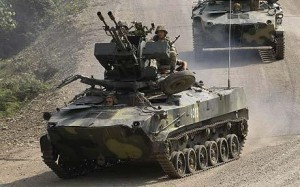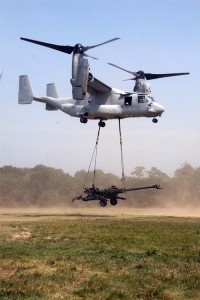The Captain’s Journal will take great interest in the 26th MEU for the remainder of its current deployment. The 26th MEU consists of the USS Iwo Jima and USS San Antonio, are they are joined by amphibious dock landing ship USS Carter Hall, the guided missile cruiser USS Vella Gulf, the guided missile destroyer USS Ramage, the guided missile destroyer USS Roosevelt and the fast attack submarine USS Hartford.
The USS Iwo Jima, which carries the 2nd Battalion, 6th Regiment (2nd Marine Division), left the Norfolk Naval Station on Tuesday. On the other hand, the USS San Antonio has had equipment malfunctions that kept her in port.

Hydraulic problems have delayed the maiden deployment the amphibious transport dock San Antonio (LPD-17), which was supposed to leave Aug. 26 with the Iwo Jima Expeditionary Strike Group.
The ship, which has endured lengthy delays and cost overruns, had to stay back in Norfolk due to a broken stern gate that will take days to repair, said U.S. Navy Lt. Cmdr. Herb Josey, spokesman for Naval Surface Force Atlantic.
The amphibious assault ship Iwo Jima left the pier at 11 a.m. without San Antonio and is headed to North Carolina to onload the rest of the Camp Lejeune-based 26th Marine Expeditionary Unit.
Capt. Brian Smith, Amphibious Squadron 4 commander, said the problem with San Antonio was discovered Aug. 24 and he expects the new amphib – the lead ship of the LPD 17 class – to be repaired and outbound by the end of this week.
“There is nothing that will keep San Antonio from getting underway,” he said. The problem is a mechanical failure in a ram cylinder piston that controls the stern gate, he said, crucial for conducting well-deck operations, an amphib’s very reason for existence.
San Antonio’s fleet debut has been a rocky one. It underwent two scathing inspection reports and had to miss its first shot at deployment in February with the Nassau ESG.
Smith defended both San Antonio and the San Diego-based amphib New Orleans, the second ship in the class, which was deemed “degraded in her ability to sustain combat operations” by a recent Navy inspection.
“Any new ship is going to be scrutinized and discrepancies will be generated,” he said.
But intense scrutiny isn’t really the problem. The problems run far deeper, into management of the design and construction process.
… the San Antonio had a troubled fleet debut. After arriving late and over-budget in 2005, an initial inspection report revealed major problems.
Board of Inspection and Survey officers found the ship “incomplete” and unsafe for crew members to board in a July 5, 2005, report. Inspectors found “poor construction and craftsmanship … throughout the ship.”
Wiring was also problematic.
“Poor initial cable-pulling practice led to what is now a snarled, over-packed, poorly-assembled and virtually uncorrectable electrical/electronic cable plant,” the report states.
The San Antonio made headlines again in April 2007, after the ship was deemed “unsuccessful” because of several equipment failures and “unreliable” steering during March sea trials. However, the report commends the crew for presenting the ship “professionally.”
Still, the catalog of problems prompted Navy Secretary Donald Winter to write a June 22, 2007, letter to shipbuilder Northrop Grumman complaining that two years after commissioning, the fleet “still does not have a mission-capable ship.”
Over its early life, San Antonio’s price also rose from a 1996 estimate of $876 million to $1.85 billion, once all of its discrepancies were corrected.
Unless the cable raceways and trays are done per specification, the wiring and cabling are all marked and labeled, the terminal cabinets are all labeled, the terminations are all numbered, the sliding links are all clearly marked, the relays are all labeled, and electrical engineering, logic diagrams and wiring tabulations are all certified and quality assured, the contractor has left the Navy with an unmaintainable situation.
We’ve discussed this before in Can the Navy Afford the New Destroyers, where we cataloged the demise the ship building industry in the U.S., concluding that:
Anything as complex as the engineering behind shipbuilding cannot be long sustained if a country is not actively engaged in the process. Certainly, contractors who bid the jobs believed that procedures for doing dye penetrant and radiography on welds were the same as before, and protocols for QA had not changed since the last time ships were constructed. Engineers are, after all, plug-and-play, white jumpsuit experts at everything under the sun, and also certainly the technology can be rapidly learned and applied by new, young engineers straight out of school, or who had been the understudy of engineers who had done this work before.
Only, none of this is exactly true … To be sure, accountability is the order of the day, and strict management of costs will be necessary for the Navy to be allowed to move forward with its Destroyer program. But shipbuilding is a lost science in the U.S., and recapturing it as an institution will be difficult and fraught with hidden problems for the DoD to deal with. This is not so much an issue with the Navy, or what they call the ‘Destroyers’, or how much they control the contractors, as it is with the fact that the U.S. has lost the ability to do large scale steel projects and shipbuilding.
The USS San Antonio is not a destroyer, but the basic principle remains the same. Day laborers are no substitute for professionals, hope is not a substitute for a QA program, poor design and construction practices lead to problems with maintenance, and rework always increases the cost and decreases the quality.
While at least somewhat unrelated, this brings up the issue of the refueling tanker. We have previously weighed in on this issue, but a good technical discussion is contained in a Human Events article by General John Handy, USAF (Ret.). A brief quote gives his perspective on the tanker controversy.
Somewhere in the acquisition process, it is obvious to me that someone lost sight of the requirement. Based on what the GAO decided, it’s up to people such as myself to remind everyone of the warfighter requirement for a modern air refueling tanker aircraft.
Recall that we started this acquisition process in order to replace the Eisenhower era KC-135 aircraft with a modern version capable of accomplishing everything the current fleet does plus additional needs for the future. Thus the required aircraft is of small to medium size much like the KC-135. Not a very large aircraft like the current KC-10, which may be replaced later with a comparably large aircraft.
Why a smaller to medium size aircraft? Because, first of all, you want tankers to deploy in sufficient numbers in order to accomplish all assigned tasks. You need to bed them down on the maximum number of airfields around the world along with or close to the customer — airborne fighters, bombers and other mobility assets in need of fuel close to or right over the fight or crisis. This allows the supported combatant commander the ability to conduct effective operations around the clock. The impact of more tankers is more refueling booms in the sky, more refueling orbits covered, wider geographic coverage, more aircraft refueled, and more fuel provided. A “KC-135 like” aircraft takes up far less ramp space, is far more maneuverable on the ground and does not have the risk of jet blast reorganizing your entire ramp when engine power is applied.
Just so. And TCJ wondered why, if from the beginning the specifications targeted a medium refueling tanker, extra credit would be awarded to larger air frames. It makes absolutely no sense. But regardless of this technical point, there is a more salient point that TCJ made several months ago concerning who holds a major share of EADS.
Even more worrisome is the power grab by Vladimir Putin, who is buying up the depressed shares of EADS like a corporate raider. The prospect of the authoritarian Russian leader, whose political opponents are harassed and jailed while prying journalists turn up missing or murdered, having a heavy hand in EADS affairs is deeply troubling. Russia opposed the invasion of Iraq and has sought to undermine U.S. plans to deploy a missile defense system in Poland and the Czech Republic.
The most troubling aspect of the tanker contract is the danger it poses to U.S. national security. According to a report by the Center for Security Policy, EADS has been a leading proliferator of weapons and technology to some of the most hostile regimes in the world, including Iran and Venezuela. When the U.S. formally objected to EADS selling cargo and patrol planes to Venezuelan despot Hugo Chavez, EADS tried to circumvent U.S. law by stripping American-built components from the aircraft. Chavez is now building an oil refinery in Cuba to keep Castro’s failed Communist state afloat, funding terrorists seeking the violent overthrow of Colombia’s government, and recently meddled in the presidential election in Argentina with secretly smuggled cash contributions. If EADS had its way, Chavez would now be advancing his anti-American designs in the Western hemisphere with U.S. technology and components.
EADS entanglements with Venezuela make the Pentagon’s decision to waive the Berry Amendment, which prohibits the export of technology that might be developed during the building of the tanker to third parties, indefensible. Given the sophisticated radar and anti-missile capabilities of military tankers, this is no small matter. Such technology falling into the hands of state sponsor of terrorism would devastate our war fighters.
EADS entanglements with Venezuela make the Pentagon’s decision to waive the Berry Amendment, which prohibits the export of technology that might be developed during the building of the tanker to third parties, indefensible. Given the sophisticated radar and anti-missile capabilities of military tankers, this is no small matter. Such technology falling into the hands of state sponsor of terrorism would devastate our war fighters.
And such a scenario is hardly unreasonable. EADS executives recently attended an air show in Iran and were caught red-handed trying to sell helicopters with military applications. When confronted, an EADS executive said the company was not bound by the U.S. arms embargo against Iran. EADS also sold nuclear components vital to exploding a nuclear device to an Asian company that in turn sold them to an Iranian front operation.
As TCJ coverage of the unwarranted Russian aggression against Georgia has made clear, we consider Vladimir Putin to be a gangster and international criminal. Any involvement with Putin – any involvement, including the Airbus – should be rejected without further consideration.
Technology is hard to regain once it has been lost. This is true of ship building, engineering QA, and air frame design. It is not only good for the U.S. economy and technological capabilities to have this done in the States, but it enables holding contractors accountable, something that we can never do with gangsters and criminals. It is yet to be seen how this will play out. But only the U.S. could be so stupid as to award a contract for our military refueling tankers to Vladimir Putin.







